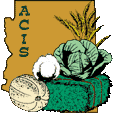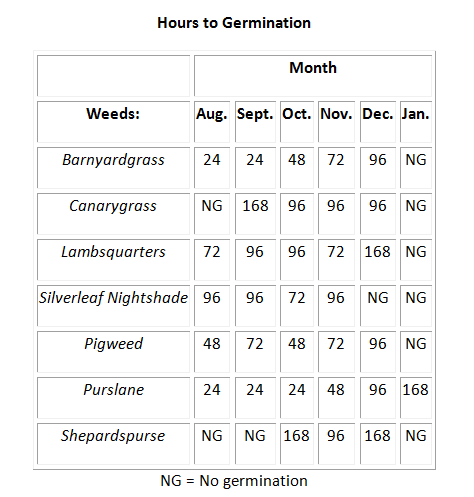
|
|
|
|

|
|||
|
|
|||
|
|
|||
One of the primary factors that affects weed seed germination is soil temperature. Every year can be different and this year ,so far, has been warmer than most. It is difficult to predict what effect this will have on weed seed germination We conducted a test to determine how long it took for various weed seeds to germinate after they were exposed to moisture. Seven summer and winter annual weeds, two grasses and five broadleaf weeds were chosen for this test. Seeds for these weeds were placed in teabags and buried ¼ inch below the soil surface and in the seed row of newly planted lettuce fields prior to the germination irrigation. Teabags were pulled every 24 hours and evaluated for germination. This procedure was repeated in both sprinkler and furrow irrigated fields at 8 locations at Roll, Bard, The Gila Valley, and the Yuma Valley. The tests began in August and were conducted each month until February. The time to germination appears in the following table. The time to germination for the summer annual grass (barnyardgrass) was 24 hours in august and September, became longer in October (48 hours) and still longer in December (96 hours). It did not germinate in January. The winter annual grass (cannarygrass) took 168 hours to germinate in September and dropped to 96 hours in December. The summer annual broadleaves took from 24 hours (Purslane) to 96 hours (Pigweed and Nightshade) to germinate. The winter annual broadleaf weeds (lambsquarters and Shepardspurse) took from 72 to 168 hours to germinate. So far this year it looks like the winter annual weeds are germinating quicker than normal and that summer annuals are hanging on longer. |
|||
| Back | |||
|
For questions or comments on any of the topics please contact Marco Pena at the Yuma Agricultural Center.
|
|||
|
Home |
Cotton | Veggies |
Forages | Grains
| Citrus |
Crop x Crop Insects | Diseases| Weeds | Pesticides | Economics | News | Weather | Research | Photos | Contacts | General Info. Copyright © 2001 University of Arizona, College of Agriculture and Life Sciences Webmaster: Al Fournier (acis@ag.arizona.edu) |
|||

